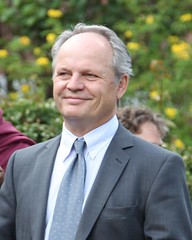 Dieter Schillinger joined the board of trustees of the International Livestock Research Institute (ILRI) in 2009. This week he attended his second meeting of the board, held in Addis Ababa, Ethiopia.
Dieter Schillinger joined the board of trustees of the International Livestock Research Institute (ILRI) in 2009. This week he attended his second meeting of the board, held in Addis Ababa, Ethiopia.
He first got to know one of ILRI's forebears, the International Laboratory for Research on Animal Diseases (ILRAD), in the 1980s. He was then head of a German project developing new pharmaceuticals for trypanosomosis, a tsetse-borne disease that causes major problems for Africa’s livestock farmers. ‘We didn't have any success for trypanosomosis in cattle, but we did better with camels,’ he recalls, ‘and I still think of myself as a “camelophile”’.
A veterinarian by training, he now works as head of public affairs for Merial, one of the world's largest animal health companies, and chairs the Food Chain Committee of the International Federation for Animal Health.
One of the first things to impress Schillinger at ILRI was the broad range of interests represented on the board. ‘This came as a welcome surprise,’ he explains, adding that ILRI is a very different beast to ILRAD. ‘ILRAD was very focused on animal health research, whereas ILRI has a more balanced approach, integrating a range of different research activities related to livestock farming,’ he explains.
According to Schillinger, ILRI has an important role to play not just in providing solutions to the problems facing livestock farmers in the developing world, but in alerting people in the North to the importance of animal health issues. ‘Nowadays, everybody in Europe—politicians, the public, nongovernmental organizations—looks at livestock from the point of view of animal welfare,’ he says. ‘That's a good thing, but without good animal health, you don't have good animal welfare, and the research conducted by ILRI is therefore leading to better animal welfare.’
Schillinger also believes that ILRI's research can provide significant benefits for human health in the North. ‘Here’s an institution that’s working on diseases in Africa that could spread to Europe, including zoonotic diseases that can be transmitted from livestock to humans,’ he says. With the increase in travel and trade, and the likely effects of global warming, the risk of diseases spreading from one continent to another has risen.
‘If we can control livestock diseases in Africa, they are less likely to spread, and I think there will be more funds for this sort of research in the future,’ he says. ILRI can legitimately claim to be conducting research that benefits not only the rural poor in Africa but also the wealthier populations in the North.
